Arizona Wild Flowers
Pictures, Photos, Images
Descriptions, Information, Reviews.
Mexican Palo Verde, Parkinsonia (Cercidium) aculeata.
We Are Proud Of Our SafeSurf Rating!
Click On Any Of The Following Links By Amazon.Com
For Books, & Videos About Wildflowers Of Arizona & The Southwest USA. No Obligation!
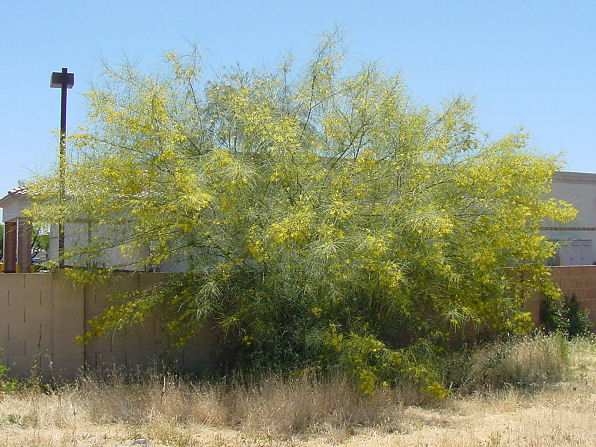 |
| Mexican Palo Verde, Parkinsonia (Cercidium) aculeata Photo Taken May 08, 2005. In Glendale. |
|---|
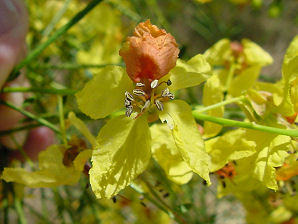 | 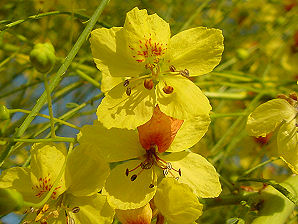 |
| Mexican Palo Verde Flower Red - Brown (Banner) Petal Is A Distinguishing Feature! | Mexican Palo Verde Flower Red - Brown (Banner) Petal Sometimes Has Only A Few Red Marks! |
|---|---|
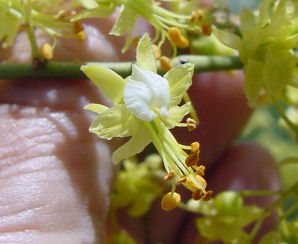 | 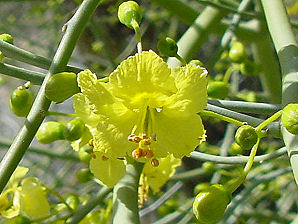 |
| Foothill Palo Verde Flower The White(Banner) Petal Is A Distinguishing Feature! | Blue Palo Verde Flower Yellow (Banner) Petal Is A Distinguishing Feature! |
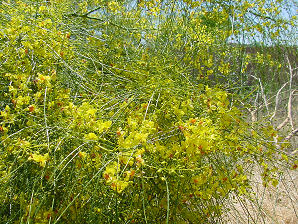 | 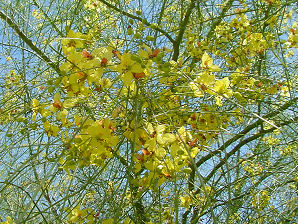 |
| Mexican Palo Verde Bright Yellow Red Flowers | Mexican Palo Verde Bright Yellow Red Flowers |
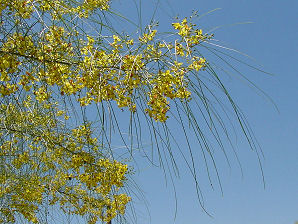 | 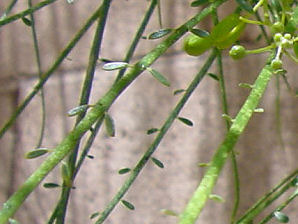 |
| Mexican Palo Verde Bipinnately Compound Narrow Leaves About 20" Long | About 3/16 Inch Long Leaflets On Long Stem Of Bipinnately Compound Leaf |
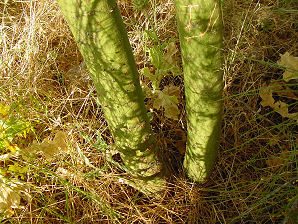 | 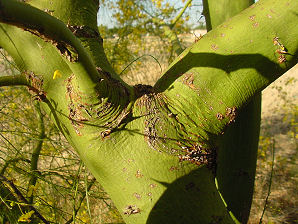 |
| Mexican Palo Verde Trunk Yellow-Green Bark | Mexican Palo Verde Bark Sometimes Has Gray Scars On It. |
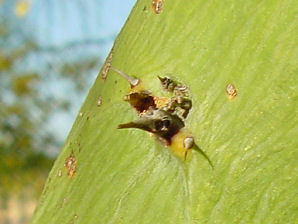 |  |
| Three Mexican Palo Verde Thorns Spaced Short Distance From Each Other On trunk | Mexican Palo Verde Thorns On Branches And Trunk |
 /
/

Mexican Palo Verde.
We wish to thank Wikipedia, the free encyclopedia for some of the information on this page. We share images and information with Wikipedia. A plant native to Mexico and to the Northern South Americas. A desert tree with spectacular yellow spring bloom and light green trunks. At one time it was used as a landscaping plant in Arizona, but it has been largely discontinued due to the massive maintance requirements of the plant. Mexican palo verde is a multitrunked, deciduous, large shrub or small tree to about 15 feet tall, rarely to 25 or 30 feet in deep soils. The yellowish-green branches are drooping more than in the blue palo verde. Mexican palo verde can be attacked by the palo verde borers which will destroy the roots, and eventually cause the death of part the tree. It has considerable thorns, so care should be taken when planting it that it won't interfere with anyone walking near it. It has a short lifespan said to be not much longer than 20 years. It is easily recognized by its branches with very long streamers on the branches. There also are spines on the branches grouped in threes. Four species of palo verde grow in the Sonoran Desert and sometimes naturally hybridize. Foothill palo verde hybridizes fairly commonly with Mexican palo verde (Parkinsonia) where both species grow in proximity.
Quick Notes:
Height: Up to about 15 feet. It rarely can grow up to 25 or 30 feet in deep soils.
Flowers: Bright yellow with five petals but, with one being a red - brown (banner) petal, sometimes the banner petal has red - brown marks only. Pistils may be dark red - brown.
Flowering Time: May - June.
Seed Pod: A dark brown pod 2-4 inches long, constricted between seeds.
Seeds: Smooth hard seeds are only slightly flattened with 2 to 7 found in each pod. Seeds are dark red - brown.
Stems/Trunks: About six inches to one foot in diameter. The branches and most of the main trunk are smooth and slightly yellow-green turning gray to brown with age.
Leaves: Leaves are bipinnately compound with prominent (needle-like) midrib, about 20 inches long, sometimes longer; up to 30 leaflets, each about 3/16 inch long, on the midrib may or may not be present.
Found: Native from Mexico into the northern South Americas. It was used for landscaping in Arizona in the 1980's to about 2000. Now it is not used too often.
Hardiness:
Soil pH requirements:
Sun Exposure:
Elevation: 0 - 4,200 feet.
Habitat: Mostly found on desert slopes. It is an ideal xeriscape landscape plant in Arizona.
Miscellaneous: Flowering Photos Taken May 8, 2005 At Phoenix, Arizona. This tree is rather messy. Not pool friendly.
|
We Are Proud Of Our SafeSurf Rating!



We Are Proud Of Our SafeSurf Rating!
Click On Any Of The Following Links By Amazon.Com
For Books, & Videos About Xerioscape Plants Of Arizona & The Southwest USA. No Obligation!
| © 1966 - Present, Audrey, Eve, & George DeLange |


